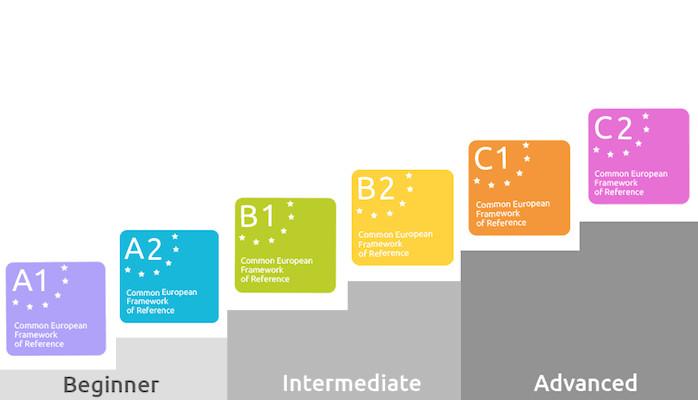How to evaluate your students’ English level – CEFR
It can be very tough for the new students to be more vocal in English since some feel shy or are not confident enough. It’s best to use CEFR to evaluate your students’ English level.

CEFR stands for ‘Common European Framework of Reference for Languages’. It was created 20 years ago by the council of Europe to provide a transparent, coherent, and comprehensive basis for the elaboration of language syllabuses and curriculum guidelines. Essentially it’s the design of teaching and learning materials along with the assessment of foreign language proficiency.
The framework of CEFR defines six common reference levels. A1 and A2 are equivalent to a basic level and B1and B2 refer to intermediate or upper-intermediate level. C1 and C2 are equivalent to the advanced level.
In private lessons it might not be crucial to know the exact level of a student in your class. He/she can be accessed throughout their course. But if the level of the student is known in the trial lesson, it makes things easier. It’s easier for you to know which level of vocabulary to use and if you should increase or decrease the speed of your speech.
How to evaluate your students’ English level online?
We have compiled 5 simple ways to make it easy for teachers to evaluate your students’ English level online. We are in the age of technology. More and more classes are going digital. It’s best to have some techniques that can help you with your students from your computer.
1. Whatsapp/messaging (evaluate your students’ English level)

Messaging is a great way to evaluate your students’ English level.
Firstly, you can contact the student on WhatsApp or any other social platform and message them for a few minutes back and forth. This can help you understand their level of writing. You can peruse through the grammar mistakes as well as the spelling and vocabulary use. It’s best to ask them first that they don’t use any translation software while writing you the messages. This ensures that you have a genuine understanding of the students writing skills.
2. Simple exercises for reading comprehension

Reading comprehension is a useful tool to help evaluate your students’ English level.
The second thing you can do is have them read a passage and answer comprehension questions. With K5 learning you can get free stories to assess your students reading comprehension level. If your students are certainly on an advanced level or are older students wanting to learn for business, try Breaking News English.
3. Video Dialogue

Video dialogue is incredibly useful when you evaluate your students’ English level.
You determine your students English listening comprehension level, try using video dialogues. Have your student listen to conversations in English before asking them to explain what the conversation was about. You can incorporate more specific questions about the dialogue as well. You can find loads of free English dialogue practices and quizzes for free at ESL Lab.
4. Photos Description

Photo description can help you evaluate your students’ English level.
To analyze your students speaking, you can try photo description. This is a great activity that helps the teachers quickly understand the speaking level of the student. You can search for something fun on google (such as ‘dogs and owners look alike’). You can click on one of the photos and ask your students to describe what they see. They can start with appearance and you can judge the level they’re on by the vocabulary they’re using (for example, if they’re at an advanced level , they might describe the person as having freckles or wrinkles).
5. Optical illusions (evaluate your students’ English level)

Optical illusions are the fun way to evaluate your students’ English speaking level.
Another fun activity to analyze speaking for students that are at least B1 or B2 level is optical illusions. The students will be intrigued to know what it is and try to answer what they see using more descriptive adjectives.
What to expect from an A1 level student
An A1 will have basic abilities to communicate and exchange information in a very simple way. An A1 might needs to control the following :
- Nouns, articles , pronouns
- Simple past, present, and future
- Ing and the infinitive
- Adjectives and adverbs
- Modal verbs, for example, can
- Basic prepositions such as in, on, and at
What to expect from an A2 level student
An A2 has the ability to deal with simple, straightforward information and begin to express oneself in a familiar context. A2 is also going to have more vocabulary than A1.
An A2 will be able to use:
- Passive voice
- ‘Use’ of used to or be used to
- Question forms
In terms of vocabulary, you can assess the A2 student with the following :
- Colors
- Parts of body
- Food
- Parts of the city
- Hobbies
What to expect from a B1 and B2 level students
A B1 will have the ability to express oneself in a limited way in familiar situations and to deal in a general way with non-routine information.
Student at B2 level
A B2 will have skills to achieve most goals and express oneself on a range of topics.
Regarding grammar, the student will be able to determine the following:
- Present and past perfect tense
- Question tags
- Common collocations
- Common phrasal verbs
- Indirect speech/reported speech
In terms of vocabulary, the student should be able to communicate and have knowledge about weather, sports, feelings, environment, and entertainment.
Assessing B1 or B2 students. You can assess them by asking them about ‘conditionals’ and showing them certain pictures. For example, you can ask them to compare a couple with a lot of kids and another with a lot of pets. Ask them which one they would prefer to be and why. If they can do it well, you can move them to other exercises with second conditionals and ask them to match with phrasal verbs.
What to expect from a C1 and C2 level students
A C1 student has the capacity to deal with academic material, understand a wide range of demanding structures , recognize implicit meaning. They are starting to understand irony and are able to perform complex tasks related to work and study.
You might assess the student wrongly in the start and he/she might or might not be better than the level assigned, but you can always change the level once the student is fully assessed.
A C2 student will almost always have a specific topic they are wanting to study in detail. This is usually due to the work field that they are in or the major of their study at university.
Through such techniques, you can easily help your student be fluent in English speaking and writing.
For online teaching jobs that you can apply for today, check our ONLINE TEACHING JOB LISTS HERE.
For FREE lesson plans and English teaching materials, check our LIST OF FREE TEACHING RESOURCES HERE.


One thought on “How to evaluate your students’ English level – CEFR”
Comments are closed.